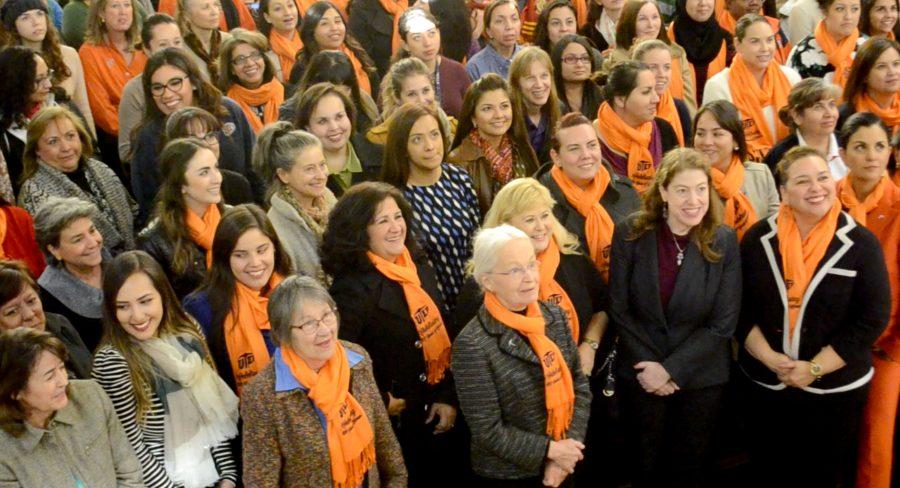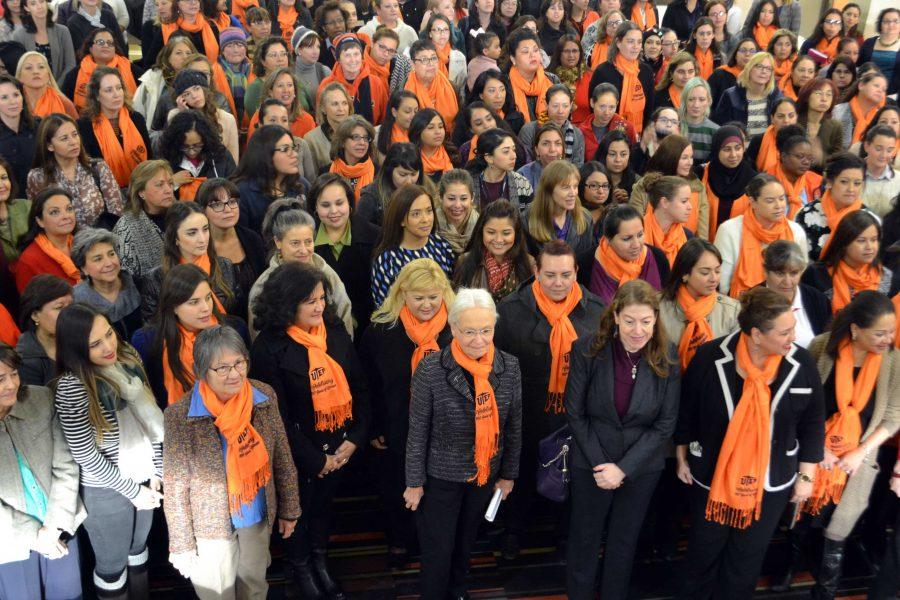Interview of Mimi Gladstein was in Spanish, the rest in English
A 100 years celebration of UTEP’s inclusion of women to the campus was commemorated with a photo shoot featuring more than 300 women in the Union East Building on Tuesday, Nov. 29. Faculty and staff, along with students were present to witness history as the photo was taken.
In 1916, Ruth Brown and Grace Odell were the first females to enroll at UTEP, which encouraged the admission of women to the school that was primarily a mining school.
UTEP President Diana Natalicio gave a commemorative speech about these students and the impact they have had in the history of the school.
Gina Nuñez, associate professor and director of women and gender studies, explained how the idea to commemorate 100 years of women’s inclusion at the university took place.
“It all started with one of our students, who is now women studies major, who walked into our office and said ‘you know it’s been a 100 years since women have been at UTEP?’ and I said ‘put it on the board and let’s see what we can do about it,’” Nuñez said. “Someone walked into the office and observing that history board and she did the math and I think this has to be recognized and celebrated in any way we can.”
Professor Mimi Reisel Gladstein was one of the memorable faces at the event. She was known to be a pioneer in women studies back in the 1970s and she also managed, despite hardships, to obtain a position as the head of the English department, thus replacing the man who once told her “we don’t hire housewives.”
She first came to UTEP in 1954 and proclaimed the university “has changed a lot.”
“When I arrived here as a student, women could not come to school in jeans. It was prohibited, and I was the first professor to give lessons wearing jeans,” Gladstein said.
Glastein also went on to applaud the way the university has changed, especially because UTEP has a female president who can “perform the job better than a man.”
“We have a woman president, we have a variety of women deans and women professors, so they continue to advance,” Gladstein said. “Although we have many women in liberal arts, I would also like to see other departments, who have few women, in the search for more women.”
Karen Aguilar, senior international business and human resources major, took a memorial photo and was excited about the experience of the event. She said an event like this is how one notices the growth in women.
“Me, being a senior graduating this semester, it is really interesting to know that a 100 years ago the first women were on this campus,” Aguilar said. “Being able to say that and to see how far women have come in the past, how a president is a woman and she is an influential person in the nation, being able to celebrate this milestone in our lives and being able to be a part of it, is really amazing.”
Aguilar considers President Natalicio her my role model.
“I actually changed my major because of her. I wanted to be more involved in student affairs, and so definitely having her as the president of the university is a great experience,” Aguilar said. “I think she is a great person, she motivates students and she is here for all of us most of the time. I am really excited to say she was my president when I was an undergrad.”
Nuñez is collaborating with Associate Provost Donna Ekal, Administrative Assistant Laura Fernandez, among other staff and the community of El Paso to publish “100 Years.”
This book will consist of an anthology of women’s testimonies, featuring women who have had an impact on UTEP over the last 100 years.
”We want to recognize those who are not here, those who travel, people who have worked here and have retired, people that have graduated, people who have represented El Paso all over the world, and they come from UTEP and they are winning,” Nuñez said. “Often times they are the ones breaking barriers, breaking glass ceilings, to be women in engineering, women in computer science, to be women educators, to be women healthcare providers, to be mothers, to be artists, to be just amazing role models to our community.”
According to Nuñez, exhibitions of stories and pictures collected for the book will be featured during Women’s History Month from April 11-12. Nuñez said the book “100 Years” will be published sometime next semester.











